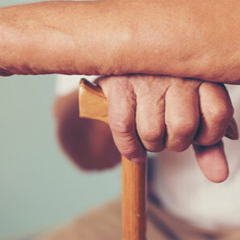Understanding the cause of your neck pain is essential to starting an appropriate and effective treatment plan, which will differ depending on the reason for your discomfort.
Neck pain or stiffness is usually from poor posture or overuse, or an awkward sleeping position. But sometimes, it can indicate a serious injury like whiplash or an illness, so a doctor’s care may be necessary.
What is Neck Pain?
The spine consists of bones (vertebrae) separated by soft cushions (discs). Nerves that travel from the brain to the rest of the body all pass through the spine. When pressure from spinal vertebrae is applied to nerves, pain, numbness, tingling or weakness can occur.
Pain is identified two different ways: acute and chronic. Most people with back or neck injuries suffer from acute pain, which lasts four to six weeks and can stop without medical treatment. Chronic pain lasts for more than three months and requires medical treatment.
No matter how sharp, or how long it lasts, neck pain often limits our ability to feel active and productive. The top priority for anyone suffering from back pain is simply to eliminate the pain.
Neck pain can interfere with daily activities and reduce your quality of life if left untreated.
Possible Causes
Neck pain has many potential causes, including:
- Age: As you age, the cervical discs can degenerate. This is known as spondylosis, or osteoarthritis of the neck. This can narrow the space between the vertebrae. It also adds stress to your joints.
- Physical strain: A strain to the neck muscles, called neck (cervical) strain, occurs when the muscles in the neck are overstretched or torn. This may result from an injury (e.g., a car accident) or from daily stresses like poor posture and sleep habits. The initial pain of a neck strain is often reported as sharp or knife-like. As time goes on, the pain often becomes more aching or throbbing in quality. Besides pain, other symptoms of a neck strain include stiffness and muscle spasms.
- Mental Stress: Tightening your neck muscles because you are stressed can lead to neck pain and stiffness. Many people who tighten these muscles when they are stressed or agitated don’t realize they do it until their neck starts hurting.
- Injury: The neck is particularly vulnerable to injury, especially in falls, car accidents, and sports, where the muscles and ligaments of the neck are forced to move outside of their normal range.
- Growths: Masses, including tumors, cysts and bone spurs, can put pressure on the nerves in your neck, causing pain.
Testing & Diagnosis
Your doctor will diagnose your condition on the basis of a personal medical history and a physical exam. During this exam, your doctor will check for tenderness, numbness, and weakness in your neck.
Your doctor will also ask about your regular activities, as well as any previous injuries that may have contributed to the problem, such as a herniated disc.
In some cases, you doctor may use information or tests, such as the following:
- Computed Tomography Scan (CT or CAT scan)
- Discography
- Electromyography (EMG)
- Nerve Conduction Studies (NCS)
- Magnetic Resonance Imaging (MRI)
- Myelogram
- Selective Nerve Root Block
- X-rays
Treatment
Non-Surgical Treatments
Most causes of neck pain are not life threatening and resolve with time and conservative medical treatment. Determining a treatment strategy depends mainly on identifying the location and cause of the pain. Nonsurgical management can alleviate many symptoms of certain types of neck pain. Your doctor may prescribe medications to reduce the pain or inflammation and muscle relaxants to allow time for healing to occur.
Physical therapy also helps relieve neck pain and prevent further damage to the spine. Physical therapists specialize in working with people who have neck and back pain. They can create an individualized treatment plan based on your daily activities, the location of your pain, and your lifestyle goals.
Surgery
When conservative treatment for neck pain does not provide relief, surgery may be needed. Patients may be a candidate for surgery if:
- Conservative therapy is not helping
- The patient experiences a decrease in function due to persistent pain
- The patient experiences progressive neurological symptoms involving the arms and legs
- The patient experiences difficulty with balance or walking
- The patient is in otherwise good health
What Can I Do to Relieve Neck Pain at Home?
In addition to taking pain relief medications, you can take steps at home to relieve neck pain, including:
- Cold therapy: The basic idea is that ice curbs the sudden pain from a new injury by constricting blood vessels, slowing circulation, and reducing swelling. This is ideal for numbing the sensation from muscle spasms or more extreme pain. If you’re on bedrest due to neck pain or strain, ice is probably ideal.
- Heat therapy: Heat, meanwhile, helps soothe chronic stiffness and tight muscles by improving circulation. This allows more nutrients and oxygen to be delivered to the affected area, which can promote healing. It also helps loosen up tight muscles and make tissue more flexible. When you are off bedrest and want to continue with day-to-day tasks, heat is ideal.
- Exercise: Follow your healthcare provider’s guidance on neck exercises, you can try to relieve neck pain and improve your range of motion. Do not attempt exercises if you have a serious neck injury or a pinched nerve.
- Stress reduction techniques: Mindfulness, meditation, breathing exercises and yoga can help relieve tension in your body that may contribute to neck pain.
How Can I Prevent Neck Pain?
You can take steps to prevent neck pain related to strains and tense muscles.
- Practice good posture
- Adjust your sleep position
- Adjust your work station
- Stay active
- Avoid carrying heavy weight on your shoulders
- Exercise your upper back extensor muscles
When to Call the Doctor
Contact a healthcare provider if you have neck pain that interferes with work or other daily activities. In rare cases, neck pain can be a sign of a medical emergency.
Seek urgent medical care if your neck pain:
- Fever, headache, and neck stiffness
- Pain traveling down one arm
- Loss of bowel or bladder control
- Extreme instability
- Persistent swollen glands in the neck
- Chest pain or pressure
How Can I Get Started?
The experienced and dedicated orthopedic surgeons at Ventura Orthopedics are here for you. If you need spinal or back surgery, it may be time to consult a medical professional. The experienced and dedicated orthopedic surgeons at Ventura Orthopedics are here for you. We are committed to helping you through any procedure until optimum health, strength and mobility are restored.
Call us today at 800-698-1280 to schedule an appointment at any of our five locations in Ventura, Oxnard, Camarillo, Thousand Oaks, and Simi Valley.















